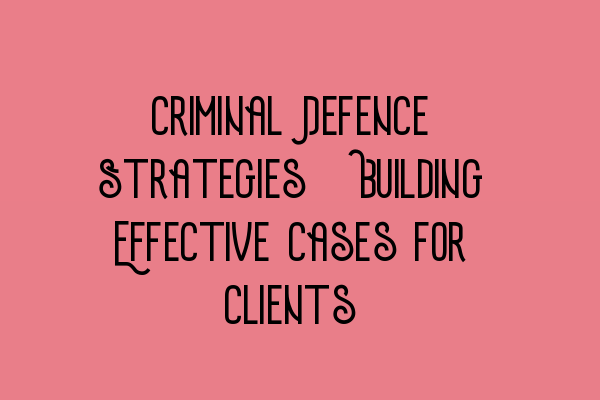Criminal Defence Strategies: Building Effective Cases for Clients
Welcome to SQE Criminal Law & Practice Law UK, your trusted partner in criminal defence strategies. In this blog post, we will discuss how to build effective cases for our clients, ensuring the best possible outcome in court.
The Importance of Criminal Defence Strategies
Criminal defence strategies play a crucial role in protecting the rights and interests of our clients. An effective strategy can make a significant difference in the outcome of a case, including charges being dropped, reduced penalties, or a successful acquittal.
Understanding Your Client’s Case
Before developing a defence strategy, it is essential to thoroughly understand your client’s case. Conduct a detailed interview to gather all relevant information, including their side of the story, evidence, witnesses, and any potential legal or factual defenses.
Once you have a comprehensive understanding of the case, you can begin to identify the most suitable defence strategy based on the circumstances and available resources.
Building a Strong Defense
A strong defence requires careful planning and execution. Here are some key steps to consider:
- Evidence Collection: Gather all available evidence, including documents, photographs, videos, and witness statements. Ensure the evidence is admissible and accurately portrays the client’s version of events. This can significantly strengthen the defense strategy.
- Legal Research: Perform in-depth legal research to identify relevant statutes, case precedents, and legal arguments that support your client’s position. This will enable you to build a solid legal foundation for your defense.
- Witness Preparation: If witnesses are involved in the case, thoroughly prepare them for their testimony. Help them understand the importance of their role, coach them on how to answer questions effectively, and address any potential weaknesses in their testimony.
- Expert Witnesses: In some cases, expert witnesses may be necessary to provide specialized knowledge or opinions. Identify and retain the most qualified experts who can support your defense strategy convincingly.
- Strategic Negotiation: Explore opportunities for plea bargains or alternative resolutions. Carefully assess the strengths and weaknesses of the prosecution’s case and negotiate from a position of strength to achieve the best outcome for your client.
- Courtroom Presentation: Develop a compelling courtroom presentation that effectively communicates your client’s defense. This includes preparing persuasive opening and closing statements, cross-examining witnesses, and presenting evidence in a clear and concise manner.
Continuous Evaluation and Adaptation
Throughout the course of the case, it is essential to continuously evaluate and adapt your defence strategy. Regularly reassess the strength of the evidence, monitor any developments in the case, and stay updated with changes to laws and regulations that may impact your client’s defense.
By staying proactive and adaptive, you can ensure that your defence strategy remains effective and maximizes the chances of a favorable outcome for your client.
Conclusion
Building effective criminal defence strategies is a multidimensional process that requires expertise, thorough preparation, and strategic thinking. At SQE Criminal Law & Practice Law UK, we are committed to providing the highest level of legal representation to our clients, employing innovative approaches to safeguard their rights and interests.
For more information on SQE sample papers and practice materials, please check our related article: SQE Sample Papers: Practice for Exam Success.
Additionally, if you want to master key concepts of SQE1 and SQE2, we recommend reading our article: Focus Areas in SQE1 and SQE2: Mastering Key Concepts.
Adjusting your SQE strategy based on mock performance is crucial for success. Find valuable insights in our article: Adjusting Your SQE Strategy Based on Mock Performance.
To improve performance, SQE mock debrief sessions are critical. Learn more in our article: SQE Mock Debrief Sessions: Critical Steps for Improvement.
Lastly, post-mock feedback sessions are essential for continuous improvement. Check our article: Post-Mock Feedback Sessions: Improving Your Performance.
Thank you for choosing SQE Criminal Law & Practice Law UK. We are here to support you and provide expert guidance in building effective criminal defence strategies for your clients.
